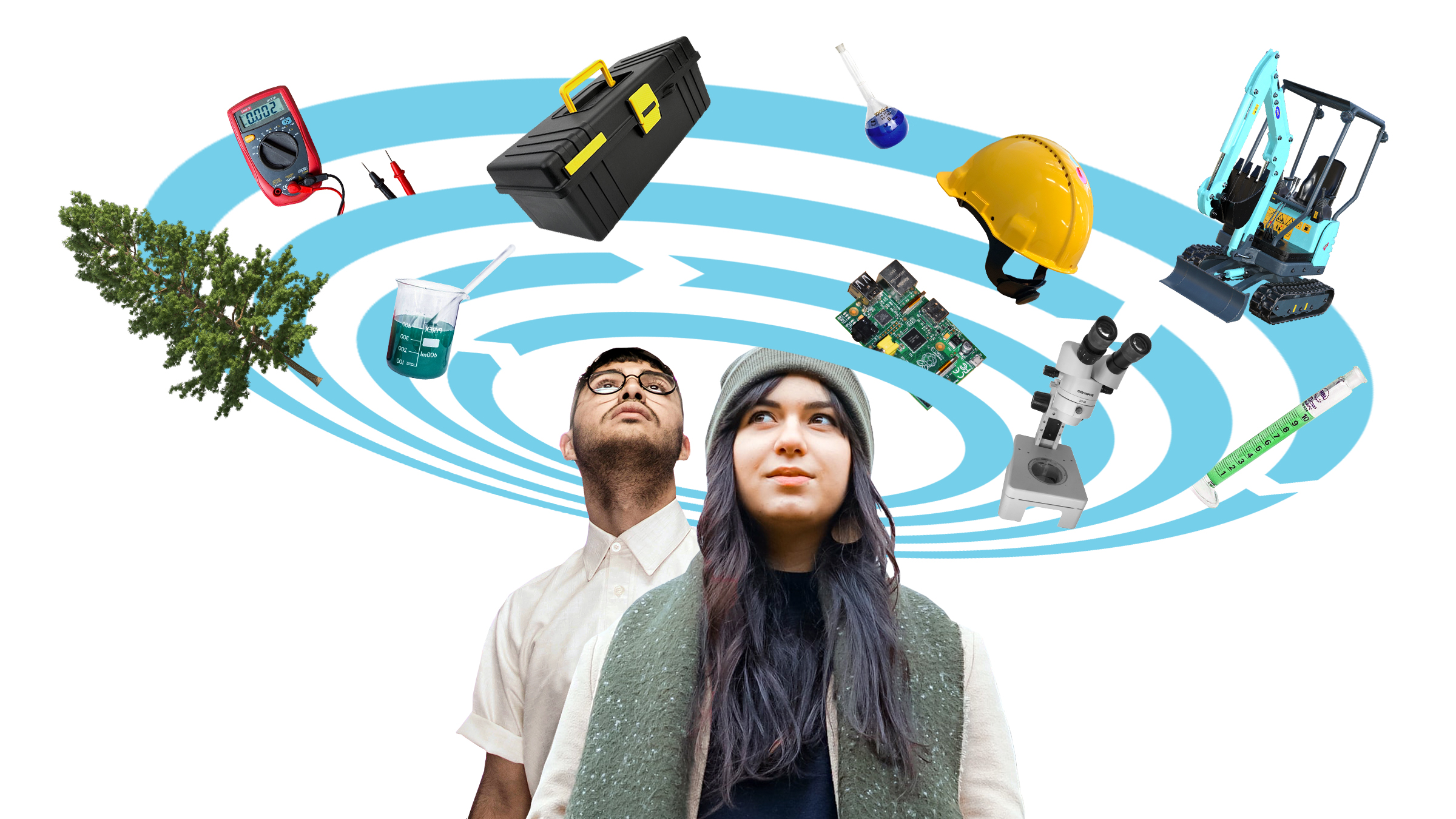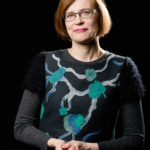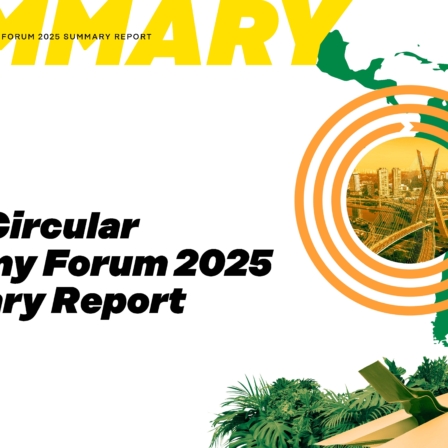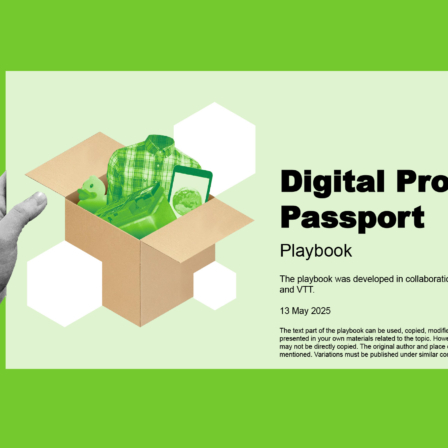The transition to a circular economy requires updating competence in different sectors, at different educational levels and alongside work, so that there will be enough decent work for everyone and everyone will be able to keep up with the change. It is also a question of competitiveness, because the circular economy will not be built without skilled builders.
Vocational education and lifelong learning in particular need new solutions, allowing professionals in different sectors to apply the principles of a carbon-neutral circular economy to their own work.
However, we do not yet know precisely what kind of expertise will be needed in different occupations, at different educational levels and in circular economy processes, or what will be the best way to teach these skills.
In order to answer these questions, Sitra is opening a call for funding for vocational institutions and lifelong learning parties. Our aim is to increase expertise in a carbon-neutral circular economy in the technology, chemical and construction sectors.
The chosen sectors play a significant role in Finland’s employment and exports. In addition, they can contribute to tackling climate change and biodiversity loss, and already they have all taken steps towards a carbon-neutral circular economy with the low-carbon road maps they have prepared, for example.
With the call for funding, we want to bring the visions and strategies of the circular economy to the practical level and learn more about the practical competence needs that will emerge in a carbon-neutral circular economy. We also want to find out how the required competence could be developed in vocational education and lifelong learning in particular.
What we are looking for
In the call for funding, we are looking for educational content targeting the technology, chemical and construction sectors that support the transition of the industries to a carbon-neutral circular economy.
The chosen project can, for example, be a new course on the circular economy at a vocational institution, a package of supplementary training for a specific professional group, an experiment carried out in co-operation with businesses or innovative educational materials.
In practice, funding can be allocated to, for example:
- modular planning expertise, demolition expertise or the development of renovation in the construction industry;
- studying new circular economy technologies in the technology industry;
- increasing expertise in the usability, sustainability or recyclability of different materials in the chemical industry;
- increasing the circular economy expertise of teachers.
The projects chosen for each industry will be reviewed in co-operation with the sector’s trade unions and industry federations.
We are looking for a few impactful and visionary projects instead of many small-scale projects. Our aim is to fund one to three projects in each industry (the technology sector and the chemical and construction industries). A maximum of EUR 200,000 will be available for funding a single project.
Here are some of the characteristics we are looking for in a good project:
- the project identifies a specific competence need relating to a carbon-neutral circular economy and a solution idea with which the competence need can be met plausibly in new ways;
- the project can be realised together with other educational institutions, businesses, the public sector, municipal organisations or other relevant parties;
- the project can become a continuous activity and the lessons learned from it can be extensively disseminated to other educational institutions, for example.
What we are not looking for
We are interested in hearing about different project ideas and solutions! However, project funding will probably not be granted to projects that:
- continue existing activities, such as a course or training programme, unchanged;
- are a small-scale experiment carried out by a single operator and only reach the students of a single course, for example;
- implement pilot projects that do not theoretically have the chance of becoming established or spreading after the pilot project.
How to get involved
The call for funding is open to vocational institutions and organisations that offer lifelong learning content, such as universities, colleges and other similar parties.
The call for funding is open from 1 February to 31 March 2021. You can submit your application using an online form.
Only legal persons, such as municipalities, limited companies, registered associations and foundations may submit applications.
If the project will be realised by an undertaking or other entity engaged in an economic activity, the funding will be granted as de minimis aid. The aid will be granted in compliance with Commission Regulation (EU) No 1407/2013 of 18 December 2013 on the application of Articles 107 and 108 of the Treaty on the Functioning of the European Union to de minimis aid (published in the Official Journal of the European Union, no L 352, 24 December 2013). An undertaking is an entity engaged in an economic activity, regardless of its legal status and the way in which it is financed. All activities in which goods or services are offered on certain markets are considered to be economic activities. Non-profit entities can also offer goods and services on the market, in which case the regulations on state aid will be applied to them.
The applicant must be eligible to receive de minimis aid up to the amount applied for. The applicant shall submit a de minimis notification to Sitra. The value of de minimis aid received by the applicant during the current and two preceding tax years must not exceed EUR 200,000, including the benefit applied for. The de minimis notification shall inform Sitra of the amounts of de minimis aid received during the current and two preceding tax years.
If the applicant taking part in the call for funding has received de minimis aid of an amount that does not make additional aid possible during the current and two preceding tax years, Sitra will reject the application.
Application selection process and evaluation criteria
Content of the application
The application form is to be completed and submitted to Sitra by the deadline via the Webropol platform. The application shall indicate the following:
- contact details of the applicant organisation and contact person;
- name of the idea;
- the specific competence need the pilot project meets;
- how the pilot project will be implemented;
- who the pilot project is aimed at;
- who will implement the pilot project and the kind of expertise the party implementing it has;
- with whom the pilot project will be implemented;
- how the piloted activity will continue once the project is complete;
- why this pilot project should be chosen;
- a cost estimate of the pilot project;
- an estimate of the eligibility of de minimis aid.
More detailed evaluation criteria are presented below.
The project proposal must be the applicant’s own, and the applicant must have undisputed intellectual property rights to the solution and an undisputed right to use and further develop the solution in conjunction with the implementation of the project.
The applicant is liable for the accuracy of the information provided to Sitra and their non-infringement of the rights of any third parties.
This is not a purchase of service or other procurement. Sitra funds the aid receivers chosen based on the call for funding in accordance with the terms and conditions of the favourable funding decision, and therefore project proposals for which Sitra would purchase or otherwise obtain services from the applicants will be rejected.
Assessment of applications
The applications will be assessed in two phases. In the first phase, Sitra experts will assess all received applications based on predefined assessment criteria.
The first phase will assess the following.
- A good application defines a competence need that is closely linked to a carbon-neutral circular economy, is topical or forward-looking and concerns an extensive group of people and is not yet sufficiently covered. The competence need is described clearly and the application indicates why meeting this specific competence need would be particularly important.
- The most important part of the application is a clear and comprehensible solution idea, a training pilot project, for example. The application indicates who the pilot project is aimed at, what will be done in practice in the pilot project, which partners will take part in implementing the pilot project and the schedule with which the plan will be realised. The implementation plan is realistic and the applicant shows that the project team has sufficient expertise for implementing the project. A good application presents novel, imaginative or innovative operating methods with which circular economy expertise will be developed in practice. Furthermore, a good application clearly justifies why this specific pilot project would be best for solving the competence need presented in the application with particular effectiveness.
- The application presents how the continuity of the pilot project will be guaranteed. A good application plausibly shows that its lessons or procedures can be implemented as a continuous activity in the applicants’ own organisations or outside them, such as in other educational institutions or other industries, after the pilot project. Additional points will be granted if the applicant shows that they are able to establish and/or disseminate the lessons learned from the pilot project with particular efficiency.
The contact persons for the projects that receive the highest scores in the first phase will be invited to meetings with Sitra and an industry-specific jury. In addition to Sitra experts, representatives of the trade union and industry federation of the said industry will complement the industry-specific juries.
Line-ups of the juries:
- Chemical industry: Sitra, Industrial Union, the Chemical Industry Federation of Finland
- Construction industry: Sitra, the Finnish Construction Trade Union, the Confederation of Finnish Construction Industries RT
- Technology industry: Sitra, Industrial Union, Technology Finland
The second phase of the selection process assesses the qualified projects in more detail, taking account especially of the following:
- the significance and extent of the identified competence need;
- how realistic the project implementation plan is and its novelty value;
- the project team’s competence;
- the potential of the project for developing the carbon-neutral circular economy;
- the potential of the project to become established as a permanent activity or be disseminated for wider use.
During the selection process, Sitra can propose the development of some project proposals or the merging of two or more project proposals.
The evaluation team chooses the projects to be funded based on the first and second phases. The projects to be funded will be selected by 30 April 2021.
Approval of applications
Sitra prepares an overall assessment of granting Sitra’s financial aid to the projects based on the implementation plan, these application criteria and the proposed budget. Granting funding requires that the recipient of the aid approves the terms and conditions of Sitra’s project funding and that a funding agreement has been made. In granting funding, it is Sitra’s duty to pay attention to compliance with the EU regulations on state aid.
The projects of several applicants taking part in the call for funding may become a single project in which one applicant for funding acts as the funding recipient and contracting party, while the other parties take part in implementing the project as partners/subcontractors.
Sitra’s funding/aid to the project
The maximum amount of funding is EUR 200,000 per chosen applicant. The aim is to select one to three applicants from each sector, the technology sector, chemical industry and construction industry. The applicants may also submit the application as a consortium in which one of the applicants is the applicant with primary responsibility and with which Sitra makes the funding agreement. The applicant with primary responsibility is obliged to make the required agreements with the other members of the consortium. However, all of the members of the consortium must fulfil the terms and conditions of this call for funding.
The amount of aid granted by Sitra is 100% of all of the funding of the project. No own contribution is required.
The funding granted on the basis of the call for funding and favourable decision on funding can only be used to cover project expenses specified in the follow-up and expense appendix to Sitra’s funding project.
Sitra funding can only cover the funding recipient’s overheads if Sitra considers it justified in order to implement the project and only to the extent that they are specified in the project plan or its appendices. In this case, the provisions on overheads apply to the acceptable overheads.
The amount of overheads accepted for a project is calculated as a proportion of the total amount of the pay for effective working hours and social security contributions based on the overhead factor. The amount of overheads must not exceed 20 per cent of the total amount of wages and social security contributions of the project.
Costs covered with the overhead factor may include costs of administrative services, depreciation on machinery and equipment and use of premises, to the extent that they are not accounted for as direct costs pursuant to the general accounting principles.
Sitra will not compensate the applicant for application expenses or any other funding-related expenses.
Schedule
- The application period commences on Monday, 1 February 2021 at 9 a.m.
- Information webinars for applicants (Teams/Zoom) in weeks 5, 8 and 11.
- The application period ends on Wednesday, 31 March 2021 at 5 p.m.
- The assessment of applications will already begin during the application period. The project teams that fared the best in the assessment will be interviewed in April.
- Selection of participants by Friday, 30 April 2021.
- The project plans will be approved and funding agreements signed by Wednesday, 30 June 2021.
- Projects implemented by 31 March 2022.
- Final reports on the projects returned by 29 April 2022.
Use of results and rights to outputs
Sitra aims to disseminate the results, knowledge and experience obtained as extensively as possible for use in society. Sitra is planning to publish a memo compiling the lessons learned and successes from the pilot projects. The final reports submitted by the applicants must be available for this purpose. Other communications concerning the content of the projects will also take place actively during the project.
By participating in the call for funding, the applicant organisation undertakes that all of the information presented in the applicant’s application and ideas and materials created in workshops arranged by Sitra and during the process are public and freely available for public use. Sitra and the parties have the right to publish and use such information accumulated during the process. We require openness throughout the process so that the information and experiences accumulated in the process will also be available for research use. Sitra additionally has, for example, the right to publish the names of the applicants participating in the application process and their proposals on its internal and external websites and in its other activities. Meetings associated with the project will be public.
Publicity of documents
In accordance with the Act on the Openness of Government Activities (621/1999), Sitra has the right to provide information about documents associated with the call for funding, the funding applicant, the amount of funding and the funded project, excluding information to be kept secret on the basis of the Act on the Openness of Government Activities, if a request for information or other enquiry is submitted to Sitra on account of the Act on the Openness of Government Activities.
Processing of personal data
The party taking part in the call for funding shall see to enforcing the right to provide Sitra with the personal data concerning the contact persons and other personal data specified in the call for funding for the purpose of implementing the project, and to ensuring the accuracy of the data.
The personal data provided in the call for funding will be used for contacts regarding any follow-up co-operation. The personal data collected in the call for funding will be processed in accordance with the Privacy policy for the Finnish Innovation Fund’s (Sitra) interest group and marketing register. Moreover, the above-mentioned personal data of the contact persons for the organisations chosen as recipients of funding will be processed for preparing and processing the funding agreement.
Other terms and conditions
Sitra has the right to make minor changes and further clarifications to the terms and conditions of the call for funding, such as extending the application period. The changes will be published on the call for funding website. Therefore, the participants to the call for funding should monitor the relevant website in order to note any changes.
Sitra has the right to suspend the call for funding if the circumstances or conditions prevailing at the time of commencing the call for funding have changed to such an extent that Sitra considers implementing the call for funding no longer possible or feasible.
Sitra has the right to exclude from the call for funding an applicant that violates the terms and conditions of the call for funding or valid legislation or if it deems that the applicant is otherwise considered to be unsuitable for taking part in the call for funding or, later, while the project is underway, in the project launched based on it. The applicant’s contact person will be informed of the exclusion by email.
If there is a conflict between these terms and conditions of application and other documents/publications associated with the call for funding, these terms and conditions of application shall take precedence.
If Sitra considers that the project proposals do not meet the criteria mentioned above, Sitra reserves the right to not fund any project.
Sitra is not liable for protecting business secrets or any direct or indirect intellectual property rights-related or other damage associated with participation in the call for funding incurred by the participants or third parties. The participants to the call for funding shall themselves protect their business secrets and intellectual property rights, where necessary.



















Recommended
Have some more.